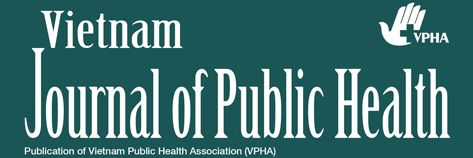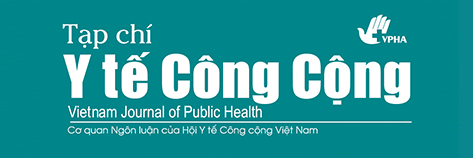Đóng góp của chương trình đào tạo Thạc sỹ Y tế công cộng, Trường Đại học Y tế công cộng vào sử dụng các năng lực và phát triển nghề nghiệp: Kết quả điều tra cựu học viên (Contribution of Master of Public Health training program, Hanoi School of Public Health to its alumni competencies application and career development: Alumni survey)
Tóm tắt
Trường Đại học Y tế công cộng (YTCC) đã tiên phong đào tạo Thạc sỹ YTCC từ năm 1997. Nghiên cứu này nhằm đánh giá đóng góp của chương trình đào tạo (CTĐT) vào việc sử dụng các năng lực YTCC và phát triển nghề nghiệp của cựu học viên (CHV).
Nghiên cứu sử dụng thiết kế mô tả cắt ngang, kết hợp định lượng và định tính. Điều tra bằng bộ câu hỏi tự điền được thực hiện với toàn bộ 359 CHV của 9 khóa, từ 2002-2010 (tỷ lệ trả lời 52,4%). 28 người gồm CHV, đồng nghiệp và người quản lý trực tiếp của CHV đã được phỏng vấn sâu.
Kết quả cho thấy tỷ lệ CHV sử dụng 7 nhóm năng lực YTCC khá cao, trên 90%. CTĐT đã góp phần giúp CHV sử dụng các năng lực này (gần 80%). Tuy nhiên, mức độ đóng góp chút ít cao hơn so với đóng góp nhiều. Vai trò đóng góp đáng kể của CTĐT đối với việc chuyển tới cơ quan công tác tốt hơn và được đề bạt lên vị trí quản lý cũng được CHV nghi nhận, tương ứng 49,4% và 63,7%.
CTĐT cần tiếp tục cải thiện nhằm tăng tính ứng dụng và dựa trên năng lực, nhấn mạnh thêm vào một số nhóm năng lực liên quan đến quá trình chính sách, vận động, phối hợp liên ngành và nhạy cảm về văn hóa.
English abstract
Hanoi School of Public Health has pioneered the Master of Public Health (MPH) training program since 1997. This research aimed to evaluate impact of the MPH program on its alumni’s application of public health competencies and career development after graduation.
This was a cross-sectional research, with a combination of quantitative and qualitative methods. A self-administered questionnaire was sent to all 359 alumni from 9 cohorts, between 2002-2010 (the response rate was 52.4%). In-depth interviews were carried out with 28 people including alumni, his/her manager and colleagues.
Results revealed a high rate, more than 90%, of 7 public health competencies application among alumni. The training program contributed to alumni’s application of those competencies (almost 80%), to some extent. The program was evaluated to contribute most substantially to alumni’s change to a better working organization and promotion to managerial position, at 49.4% and 63.7% respectively.
The MPH training program needs to be further improved to enhance alumni’s competencies applicability, with emphasis on those competencies related to policy development, advocacy, inter-sectoral collaboration, and cultural sensitivity.
Từ khóa
Toàn văn:
PDF (English)##submission.citations##
Tài liệu tiếng Việt
Lê LC, Nguyễn TH, Bùi TQ (2007). Nghiên cứu đánh giá chương trình đào tạo Thạc sĩ Y tế công cộng: 10 năm đầu tiên. Tạp chí Y Tế Công Cộng. Số 9(12).
Nguyen DT (2002). Đánh giá chương trình đào tạo thạc sỹ YTCC.
Quốc hội. Luật Giáo dục đại học. Q. hội. 2002; 08/2012/QH13.
Tài liệu tiếng Anh
Cragg C, Andrusyszyn M (2004). Outcomes of Master’s education in nursing. Int J Nurs Educ Scholarsh. 1:1. 1(1).
Davis M, Sollecito WA, Shay S, Williamson W (2004). Examining the impact of a distance education MPH program: a one-year follow-up survey of graduates. Journal Public Health Management Practice. 10(6): 556-563.
Drennan J (2008). Professional and academic destination of masters in nursing graduates: a national survey. Nurse Education Today. 28: 751-759.
Gerstel LZP, Hoffman A, Diederichs C, Borchert M, Peterhans B (2013). Fifteen years of the tropEd Masters in International Health programme: what has it delivered? Results of an alumni survey of masters students in international health. Tropical Med Int Health. 18(3): 377-384.
Green A, Perry J, Harrison K (2008). The influence of a postgraduate clinical master’s qualification in manual therapy on the careers of physiotherapists in the United Kingdom. Manual Therapy. 13(2): 139-147.
Gill KJTM, Bagherian P, Ali D (2005). Evaluation of a Master’s Degree Program in Psychiatric Rehabilitation. Am J Psychiat Rehab. 8(2): 165-174.
Kellerman R, Weiner R, Wayling S, Fonn S (2012). Investing in African research training institutions creates sustainable capacity for Africa: the case of the University of the Witwatersrand School of Public Health Masters programme in epidemiology and biostatistics. Health Res Policy Syst. 10(11).
Le LC, Bui TQ, Nguyen HT, Rotem A (2007). Alumni survey of masters of public health (MPH) training at the Hanoi School of Public Health. Human Resource for Health. 5:24.
Murray C (2001). Evaluation of a post-professional master’s program in allied health." Journal Allied Health. 30(4): 223-228.
Petersen D, Hovington M, Pass M (2005). Assuring public health professionals are prepared for the future: the UAB Public Health Integrated Core Curriculum." Public Health Rep. 120: 496-503.
Richardson P, MacRae A, Schwartz K, Bankston L, Kosten C (2008). Student outcomes in a postprofessional online master’s-degree program. American Journal of Occupational Therapy. 62(5): 600-610.
Schattner P, Klein B, Piterman L, Sturmberg J, McCall L (2007). Impact of master of family medicine degree by distance learning on general practitioners’career options. Medical Teaching. 29(4): e85–e92.
Tsimtsiou Z, Sidhu K, Jones R (2010). The benefits and costs of a master’s programme in primary health care: a cross-sectional postal survey. Br J Gen Pract. 60(580).
Wilson JP (2010). Influence of a nontraditional master’s degree on graduates’ career paths. Am J Health Syst Pharm. 57(23): 2196-2201.
Zwanikken PA, Huong NT, Qian X, et al (2014). Validation of public health competencies and impact variables for low-and middle-income countries. BMC public health. 14(1): 55.
Zwanikken PA, Dieleman M, Samaranayake D, Akwataghibe N, Scherpbier A (2013). A systematic review of outcome and impact of Master’s in health and health care. BMC Medical Education. 13(18).
Zwanikken PA, Huong NT, Qian X, et al (2014). Outcome and impact of Master of Public Health programs across six countries: education for change. Human Resources for Health.12(40).



